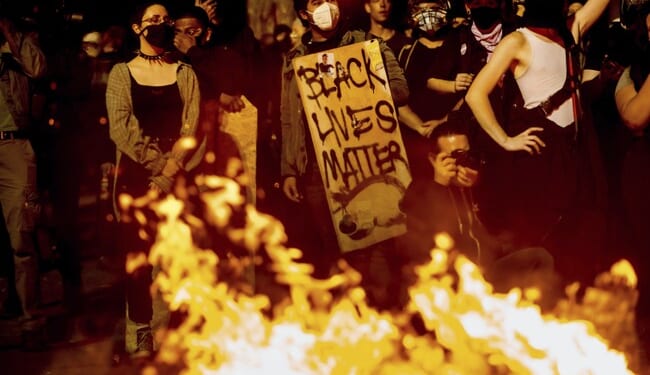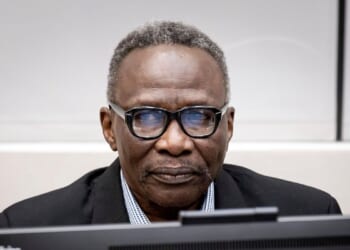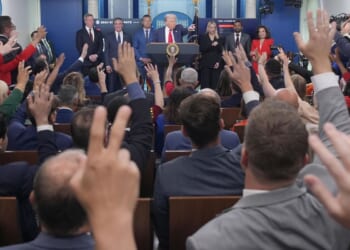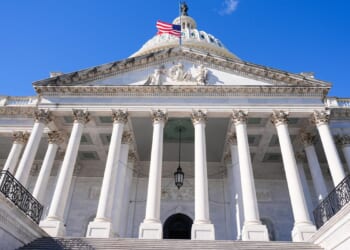
On the May 22, 2020 episode of Charlamagne Tha God’s popular podcast, Joe Biden said words that have become infamous:
“If you don’t vote for me, you ain’t black.”
He did not hesitate. He did not show discomfort. And there was very little pushback from Charlamagne. Neither seemed to understand how incredibly grotesque it was for a white politician to declare that a black man’s voting choice determined whether he was eligible to be black.
To Biden, the line wasn’t a gaffe. It was a summary. A neat little distillation of the worldview dominant in academia, DEI institutions and the activist class for the past decade:
Race isn’t ancestry anymore. Race is ideology. Race is obedience.
Biden didn’t invent that idea. He just said it cleanly. The antiracist movement had been teaching it openly:
- Ayanna Pressley demanded “Black faces that speak with black voices,” a standard built on ideological conformity, not identity.
- Ibram X. Kendi insists that “there is no such thing as ‘not racist.’ There is only racist and antiracist,” and he defines “antiracist” as agreement with his politics.
- Robin DiAngelo writes that “whiteness is not a skin tone; it is a worldview.”
- The Smithsonian’s “Talking About Race” portal claimed that values like “individualism,” “rational thinking,” “hard work,” and “objectivity” were traits of “white culture.”
In this framework, blackness is not about lineage or shared culture. It’s not about lived experience or heritage. Blackness is an ideological posture — one enforced by those who claim the authority to define it.
That’s why Biden felt comfortable saying the line. Within this worldview, he wasn’t speaking about race. He was speaking for it.
Under the new rules, a black man who doesn’t vote Democrat isn’t just wrong; he has forfeited his racial identity. And a white politician can tell him so without fear of contradiction.
“If you don’t vote for me, you ain’t black.”
Not a blunder.
A doctrine, one where your vote determines your identity. Where your politics outrank your ancestry. Where racial categories themselves have been quietly rewritten, not for justice, but for control.
Redefining Race as Ideology
The shift in racial meaning did not happen through debate or persuasion. It happened by absorption, through academic theory, DEI seminars, media repetition and the quiet pressure to avoid saying the “wrong” thing. Long before Biden spoke his infamous line, the old understanding of race had been dismantled and replaced by something else entirely.
For most of American history, race was understood, rightly or wrongly, as a matter of ancestry, lineage, phenotype and shared historical experience. It was a flawed framework, often weaponized and often used to justify cruelty, but it was at least stable. When people used the word “black,” they meant people of African descent. When they used the word “white,” they meant people of European descent. The Civil Rights movement itself depended on these categories being stable.
That world shifted when biological essentialism became taboo in academia. By the late 1990s and early 2000s, universities treated any biological framing of race as morally tainted. The new orthodoxy insisted that race was “a social construct,” that it had “no genetic basis,” and that it existed “only in the politics of racism.” There was a well-known academic slogan circulating during this period: “Race has no biological reality — only political reality.” The idea wasn’t just that race had been misused; it was that race, as traditionally understood, didn’t exist at all.
But here was the problem: while academics threw out the biological definition, activists still wanted the tremendous moral power the word “race” carried: the emotional force of injustice, the historical gravity, the cultural authority to silence dissent. So instead of discarding the concept, they reinvented it. Scholars, DEI trainers and nonprofit activists built a new schema in which race no longer referred to inherited traits but to ideological positions and patterns of thought.
Robin DiAngelo wrote that “whiteness is a worldview, not a skin tone,” and that whiteness was “dynamic, relational, and constantly shifting.” Ibram X. Kendi declared that “racial groups are not real; racism creates them,” a statement which effectively hands the power of racial definition to whoever gets to define racism. UCLA’s School of Education states plainly: “Whiteness is a set of behaviors and practices,” not a phenotype. Meanwhile, the African American Policy Forum, Kimberlé Crenshaw’s organization, asserts that “blackness is a political identity,” not a biological or cultural one.
When you put these statements together, the new rule becomes unmistakable: Race is no longer what you are; race is what you believe. The biological definition had been banished, but the political utility of the word was preserved by hollowing out the old meaning and pouring ideology into the empty space. Race became a free-floating moral category that could be assigned, withdrawn or reinterpreted depending on ideological alignment.
This redefinition did not come from ordinary black Americans. The average black churchgoer, parent, entrepreneur or community leader did not demand that race become a political identity test. This was an elite project engineered by university theorists, DEI consultants and activists who needed a way to maintain the moral authority of racial language without relying on the biological concepts they had taught everyone to treat as forbidden. Once biology was removed as the anchor, race became infinitely malleable: Asians opposing school quotas became “white-adjacent,” Black conservatives suddenly were “upholding whiteness,” and white progressives who fully embraced DEI could be praised for “centering blackness.”
What emerges is a new ontology in which racial identity is not inherited but performed, not descriptive but prescriptive. It is a system in which your political loyalty defines your racial authenticity and where dissent is treated not merely as disagreement but as betrayal.
How Blackness Became a Political Loyalty Test
Once race was redefined as ideology rather than ancestry, the next step was to enforce that ideology through social pressure, accusation and public boundary-policing. The activist class didn’t leave this to chance. They began stating openly in their own words that racial identity depends on political and ideological obedience.
Ayanna Pressley made the principle unmistakable when she declared, “We don’t need any more black faces that don’t want to be a black voice.” That statement only makes sense in the new ontology. A “black voice” doesn’t mean the authentic expression of a black person’s lived experience. It means the correct ideological script. If your politics diverge from the narrative, your identity becomes suspect. You are a black face, she says, only insofar as you perform blackness as the activist class defines it.
This view was reinforced across the media ecosystem. When Winsome Sears became the first black woman elected statewide in Virginia, MSNBC host Joy Reid dismissed her victory by saying Sears was part of “the black mouth moving” on behalf of white supremacy. The Washington Post went even further during the 2020 election by labeling Trump-supporting Hispanics “multiracial white supremacists.” The paper introduced the term “multiracial whiteness,” arguing that certain minority voters were “attracted to the ideology of whiteness” and therefore had no legitimate claim to their own ethnic identity.
Under the old definition of race, these statements would have been incoherent. Under the new definition, they are simply diagnostic: dissent = whiteness. Agreement = blackness. Identity becomes a political instrument.
Academics echoed this logic. In a much-circulated panel from the African American Policy Forum, scholars insisted that “blackness is a political identity,” explicitly detaching it from ancestry or shared culture. At UCLA’s School of Education, course materials informed students that “whiteness is a set of behaviors and practices,” not a phenotype. Robin DiAngelo, whose training materials are used in corporations nationwide, taught that whiteness is “dynamic, relational, and constantly shifting,” meaning it can be assigned to anyone — and removed from anyone — based entirely on their alignment with the antiracist worldview.
This ideological policing didn’t remain in academia or on television; it became the default mode of political commentary. When Sen. Tim Scott famously called America “not a racist country,” pundits claimed he had “lost his blackness” by refusing the victimhood narrative. When Clarence Thomas wrote opinions the left disliked, critics routinely referred to him as “a black man in whiteface,” a phrase that would have been unthinkable a generation ago. Even everyday black parents who pushed back against racially segregated “affinity spaces” or fought for merit-based admissions in schools were accused of “internalizing whiteness.” According to this worldview, independence is whiteness. Disagreement is whiteness. Self-determination is whiteness.
Meanwhile, white progressives who embraced the activist framework were encouraged to believe they could “decenter whiteness” and adopt what one DEI training described as “Black and brown modes of knowing.” In other words, blackness became something white people could perform correctly, while actual black people could lose it by stepping out of ideological line.
These aren’t fringe examples. They are snapshots of a system in which racial identity has become a political loyalty test. The boundaries of the category are enforced not by ancestry or history but by a network of academics, activists, commentators and politicians who treat ideology as the gateway to authenticity.
Once you understand that, Biden’s infamous line stops looking like an outburst and starts looking like an application of the rules. In this worldview, a black man who votes Republican is not simply mistaken; he is disqualified. The category no longer describes him. He has stepped outside the ideological perimeter, and by the logic of the new racial doctrine, he no longer belongs.
This is how race became something you can lose.
This is how race became something politicians can grant or revoke.
This is how race stopped meaning race.
Why This Redefinition Was Necessary (For Them)
Once you see how race has been redefined, the next obvious question is why the activist class, DEI bureaucracy and their political allies needed this shift. They didn’t wake up one morning and decide that ancestry no longer mattered. The redefinition served specific purposes — narrative, institutional and electoral — and those purposes become clear the moment you look at the incentives built into the antiracist framework.
The first incentive was narrative preservation. The activist worldview depends on a permanent structure of oppression in which white people remain the oppressor class and black people remain the oppressed class. That story collapses the moment individuals are free to define their own politics or refuse the grievance narrative. A black American who succeeds through hard work and rejects the role of permanent victimhood is a threat to the framework, because his very existence contradicts the ideological story. The only way to preserve the narrative is to redefine “authentic” blackness around adherence to the narrative itself. If you step outside it, you’re not simply disagreeing. You’re “not really black,” and therefore the counterexample disappears.
A second incentive was protecting activist authority. Critical race theorists and DEI trainers built careers, departments and entire nonprofit ecosystems around the idea that they alone could interpret racial reality. If race were simply a matter of ancestry, those institutions would have far less power; biology does not require a consultant. But if race becomes a set of ideological practices and psychological conditions that require constant monitoring, interpretation and remediation, then the activist class becomes indispensable. They alone can diagnose “whiteness,” “internalized racism,” “racial literacy” and “racial trauma.” They become gatekeepers of identity, morality and even language. Redefinition creates dependency.
A third incentive was electoral. Modern progressive politics relies heavily on bloc voting, especially among black Americans, who vote overwhelmingly for Democratic candidates. Any ideological shift that encourages political independence within that group threatens a major power base. By redefining blackness as political loyalty and “authenticity” as alignment with one party, the activist-political apparatus gains a powerful tool: dissent can be framed as betrayal not just of ideology, but of one’s own identity. The moral pressure this exerts is enormous. When Ayanna Pressley says, “We don’t need any more black faces that don’t want to be a black voice,” she is not talking about ethics or justice. She is talking about votes.
A fourth incentive was the preservation of DEI institutions. The DEI industry, now tens of billions of dollars strong, relies on constant racial tension and constant ideological supervision. To justify its existence, it must treat racial identity not as a fixed fact but as a dynamic problem requiring workshops, training modules and administrative oversight. If race were merely biological or cultural, DEI could not claim to “transform” anything. But if race is ideology, and ideology can be policed, then DEI becomes a permanent fixture, a kind of secular priesthood adjudicating purity and sin.
Finally, the redefinition was necessary for moral leverage. The activist conception of race is not descriptive; it is accusatory. It provides a mechanism for controlling discourse by determining who is morally permitted to speak and who must stay silent. This is how statements like “you must center black voices,” “amplify marginalized perspectives,” and “defer to people of color” became rhetorical bludgeons. But these commands only work if the category “black” is limited to people who hold the approved ideology. Otherwise a black conservative could say, “Actually, I disagree,” and the entire hierarchy falls apart. The solution is simple: redefine him out of the category. Strip him of the moral authority the category confers. Erase his identity so his dissent loses weight.
These incentives converged into a single, coherent system. Race was no longer a matter of birth but a matter of obedience. Authenticity could be granted or revoked. Identity became an instrument of control, not a description of reality. And once race was rebuilt as ideology, those who controlled the ideology gained control over the category itself.
This is why the redefinition happened. Not because ordinary Americans demanded it, and certainly not because it reflects lived experience.
It happened because it consolidates power — intellectual, cultural, electoral and institutional — in the hands of the people who get to decide what your race means.
The Consequence: Race Stops Meaning Race
Once race was rebuilt as a political identity rather than an inherited one, the entire category began to unravel. You cannot detach a word from the reality it was created to describe without collapsing its meaning. And when the activist class hollowed out race’s biological and cultural anchors, all that remained was an ideological shell, a label applied not to people, but to behaviors.
The most immediate consequence is that racial identity becomes revocable. If blackness is defined by obedience to an ideology, then blackness is something you can lose, something that can be stripped from you the moment you step outside the prescribed narrative. You can see this plainly in the way commentators talk about Clarence Thomas or Tim Scott. They are routinely declared “not really black,” “Uncle Toms,” or “black mouthpieces for white supremacy.” These are not fringe comments. They are now mainstream reactions to perfectly ordinary political disagreements. Identity becomes fragile, conditional, contingent on performance.
A second consequence is the inversion of authenticity. Under this system, a person’s lived experience matters far less than their ideological alignment. A black small-business owner in a crime-ridden neighborhood who votes for law-and-order policies is considered “inauthentic,” while a wealthy white graduate student who dedicates her social media presence to antiracism may be praised for “centering blackness.” The hierarchy flips: ancestry is irrelevant; ideology determines legitimacy. What should be an experience-based category becomes a mood board curated by activists.
A third consequence is that dissent is recast as betrayal. If racial identity is tied to political loyalty, then disagreement becomes treason. Voting the “wrong” way is no longer an exercise of citizenship. It is a violation of racial duty. That’s why Biden felt comfortable declaring, “If you don’t vote for me, you ain’t black.” In the new framework, he wasn’t overstepping. He was enforcing the boundary: authentic blackness equals political obedience. Step out of line and you’re out of the category altogether.
A fourth consequence is that the category itself becomes meaningless. A label that can apply to anyone and be withdrawn from anyone describes nothing real. If a black judge, a black senator, or a black parent can be declared “white” for dissent, and if a white activist can be applauded for “embracing blackness,” then race has ceased to be a descriptor of people and become a descriptor of attitudes. And when a descriptor no longer refers to people, it stops functioning as a category. The term becomes pure rhetoric, an implement, not a meaning.
A fifth consequence is cultural erasure. Real black history, black culture and black lived reality are flattened to make room for the ideological version of blackness. Black Americans who hold traditional values, religious commitments, entrepreneurial aspirations or moderate political views are treated as aberrations, inconvenient reminders that black America is not a monolith and never has been. The richness of black life becomes invisible because the ideological version of blackness cannot tolerate internal diversity.
Finally, the most profound consequence is moral instability. A system that lets politicians, academics and activists decide who counts as black and who does not is a system with no limiting principle. If race can be redefined at will, then so can every other identity category. Authority shifts from reality to rhetoric. Identity becomes a property right held not by individuals but by the institutions that enforce the narrative. Biden’s comment did not violate the rules of this system. It demonstrated them.
The moment race becomes ideological, race stops being race. It becomes a tool. And tools are used to control.
The Hollowing-Out Point: Race as an Empty Vessel
Once race was rebuilt as ideology, the language surrounding race began to decay. Words that once had concrete meaning — rooted in ancestry, culture and shared historical experience — were repurposed to serve ideological goals. This is not accidental. It is the unavoidable consequence of turning identity into a political performance rather than a biological or cultural fact. When “black” and “white” are no longer tied to people but to behaviors and political positions, the words lose their descriptive function and become tools for enforcing conformity.
You can see this hollowing-out process in the way racial labels are applied today. A black parent arguing for merit-based education is accused of “upholding whiteness.” A Hispanic voter is reclassified under “multiracial whiteness.” A black senator who doesn’t follow the script “isn’t really black.” Meanwhile, a white activist who repeats the right ideological slogans can be praised for “centering blackness.” Once the terms detach from ancestry, they become infinitely flexible and infinitely manipulable.
Even the minutiae of language reveals the shift. When newsrooms began capitalizing “black” while deliberately leaving “white” lowercase, they explained the difference openly: capitalizing “black” was meant to signal a shared cultural identity, while capitalizing “white,” in the words of the Associated Press, “risked legitimizing white supremacist thought.” In other words, one group was treated as a people; the other as a problem. The rule wasn’t grammatical. It was ideological, a quiet way of coding legitimacy and illegitimacy directly into the typography. (Obviously, PJ Media does not ascribe to their philosophy.)
This kind of semantic decay is not new. We’ve seen it in political terms like “fascism,” which once referred to a specific 20th-century ideology but is now used as a generic insult. We’ve seen it in words like “violence,” which activists have expanded to include speech they dislike. And we’ve seen it in the word woman, which was once a straightforward biological term and is now stretched to cover a wide assortment of self-descriptions that have nothing to do with sex. But race is unique because the stakes are so personal. When you hollow out a political term, you distort debate. When you hollow out a word that describes people, you distort the people themselves.
I saw this shift long before the jargon went mainstream. Back in the mid-2000s, I was an active commenter at Little Green Footballs, Charles Johnson’s forum, when he abruptly purged all the conservatives. My supposed “racism” consisted of defending two black female bloggers, Baldilocks, who is brilliant, and a Chicago blogger whose name to my shame I no longer remember. The moment I defended them, I was banned and labeled a racist. That was my first direct encounter with the new definition: “racist” no longer meant prejudice or malice or bias, but simply disagreement with the prevailing ideology. The accusation had nothing to do with the women I defended and everything to do with enforcing obedience.
Language becomes not a tool for conveying reality but a mechanism for policing attitudes. “Racist” no longer means discrimination; it means resisting the ideology. “Antiracist” no longer means supporting equality; it means endorsing the worldview. And “blackness” no longer describes a people; it describes a performance. The original meanings of these words become irrelevant because their new function is rhetorical, not descriptive, a way of sorting the compliant from the noncompliant.
This is what made Biden’s declaration possible. He wasn’t stumbling into racism; he was articulating the logic of a system that no longer treats race as something inherited. In a world where race is ideology, a politician can tell a black man he “ain’t black” for thinking independently. The language allows it; the hollowed-out definitions enable it; and the system rewards it. Race, once drained of its meaning, becomes whatever the ideology requires, and the people the word once described lose any claim to it the moment they dissent.
Who This New System Actually Protects
If the new definition of race were genuinely about justice, you would expect the people it claims to represent to be its primary beneficiaries. But that is not what happens. When you detach race from ancestry and rebuild it as ideological performance, you inevitably produce a system that protects institutions, not individuals; narratives, not communities. The redefinition gives enormous power to the people who control the narrative, and almost none to the people whose identities are being rewritten.
The first beneficiaries are the activist class itself. Critical race theorists, DEI trainers and nonprofit operatives gain tremendous influence by treating racial identity as something unstable and in need of constant interpretation. If blackness depends on ideological alignment, then activists become the arbiters of alignment. They alone can determine who is “centering blackness,” who is “upholding whiteness,” who is “succumbing to internalized racism” and who is performing the correct script. This grants them a supervisory role over identity, a role for which no one voted but to which everyone is expected to defer.
A second beneficiary is the sprawling DEI bureaucracy. The more fluid and nebulous racial categories become, the more justification there is for training sessions, audits, interventions and oversight. If race were simply a matter of ancestry, DEI would have far less to do. But if race is a set of behaviors and attitudes that can shift at any moment, then DEI becomes a permanent guardianship, a kind of ideological quality control department. The instability of the definition ensures the stability of the institution.
Third, the political class, primarily on the left, gains strategic advantage. When blackness is defined in terms of political loyalty, maintaining loyalty becomes a moral imperative rather than a choice. Biden’s infamous line was not a blunder; it was the articulation of a rule that political operatives have relied on for years. If a voter’s very identity is tied to a party’s narrative, defection becomes unthinkable. And anyone who attempts it can be shamed or excommunicated by claiming they have abandoned their race. This is not representation; it is ownership.
Fourth, the media ecosystem benefits by gaining a set of rhetorical shortcuts. Because the ideological definition of race is built on moral binaries — whiteness as oppressive, blackness as righteous — journalists and commentators can classify arguments without engaging them. A dissenting minority voice can be dismissed as “aligned with whiteness”; a white activist can be elevated as “amplifying black voices.” The redefinition gives the media a way to moralize disagreement without addressing substance.
Finally, the redefinition protects the narrative itself. Ideological systems survive only if they can suppress internal contradictions, and black political independence is one of the biggest contradictions the antiracist worldview faces. If black Americans can think, speak and vote independently, the narrative of permanent oppression becomes far more difficult to sustain. By redefining blackness as ideological loyalty, the system erases dissenting voices from within and turns them into anomalies rather than evidence of complexity and freedom. In this way, the redefinition protects the theory from reality.
Meanwhile, the people notably not protected by this new system are the individuals and communities the activist class claims to serve. Black parents fighting for safer neighborhoods are not protected; they are accused of siding with “carceral whiteness.” Black students seeking rigorous academic standards are not protected; they are told meritocracy is a tool of white supremacy. Black entrepreneurs who value independence are not protected; they are portrayed as victims of false consciousness. Everyday black Americans who hold traditional values, attend church, start families and build businesses find that their lived experience counts for little if they do not conform to the ideological script.
The redefinition of race, in other words, protects the machinery, not the people. It insulates institutions from criticism, shields activists from accountability, and gives politicians an unearned moral claim over entire communities. It transforms a demographic category into a political instrument and then hands the instrument to the people who benefit most from wielding it.
This is the stage-setting for the next section, the part where the consequences become mathematically absurd. Once race is ideological rather than ancestral, even concepts like reparations, which depend entirely on lineage, lose all coherence. And what fills that vacuum is not justice, but something much darker.
The Reparation Paradox: When Ideological Race Makes Justice Impossible
Reparations only make sense if race still refers to ancestry. The entire concept depends on lineage, on the idea that descendants of enslaved people can be identified as such, and that some form of restitution can be tied to that inherited history. But the new ideological definition of race makes that impossible. A category that can be assigned or revoked based on political obedience cannot serve as the basis for historical justice.
In the activist framework, blackness is not inherited; it is performed. That means a black conservative, a black moderate, or a black American who simply rejects the antiracist worldview becomes “white-adjacent” or “not really black.” If Biden can tell a man “you ain’t black” for voting the wrong way, then the ideological system is fully capable of declaring entire families ineligible for reparations based on their politics. The very people with the strongest ancestral claim become the people most likely to be excluded.
Meanwhile, white progressives who “decenter whiteness” and “embrace blackness” could, by the logic of ideological race, be counted as aligned with the category. When blackness becomes a posture rather than a lineage, nothing prevents the category from expanding to include ideological allies while shrinking to exclude ideological dissenters.
In that world, reparations cease to function as restitution and become a political patronage system. The payouts go not to descendants of enslaved people, but to those who uphold the narrative. Merit is ideological. Eligibility is ideological. Identity itself is ideological.
Once race stops meaning race, reparations stop meaning reparations. The entire concept collapses under its own weight. What remains is not justice but loyalty enforcement.
Closing: When Identity Becomes a Weapon
The modern antiracist movement claims to be expanding justice, but what it has actually expanded is control. By redefining race as ideology, it has turned identity into something granted or revoked by political authority. Biden’s line sounded outrageous to anyone still living in the old world, but within this new framework it was perfectly consistent. He wasn’t announcing a belief; he was applying a rule.
When race stops being anchored in ancestry, culture or lived experience, it becomes whatever the ideology requires in the moment. Disagreement becomes whiteness. Obedience becomes blackness. Authenticity becomes a credential issued by activists, media figures and politicians who benefit from controlling access to the category. And once that mechanism is in place, dissent isn’t just wrong. It’s heretical.
The tragedy is that this system claims to defend black Americans while silencing many of them. It claims to honor black history while erasing anyone whose life doesn’t fit the script. It claims to confront racism while redefining the word until it describes nothing but disagreement. And in the process, it destroys the very idea of racial identity by detaching it from the people it once described.
A society cannot function when its most charged moral language is severed from reality. It cannot deliberate honestly when words like “black,” “white,” “racist” and “justice” change meaning depending on who is speaking. And it cannot protect vulnerable communities when identity itself becomes a political loyalty test.
When race stops meaning race, power fills the vacuum. And once power controls identity, everything else — speech, dissent, politics, even ancestry — becomes negotiable.
That is the world revealed in Biden’s infamous line. And until we confront the ideology behind it, the line should not be remembered as a gaffe.
It should be remembered as a warning.
Editor’s Note: Do you want more cultural content like this? Support PJ Media!
Join PJ Media VIP and use promo code FIGHT to get 60% off your membership.









